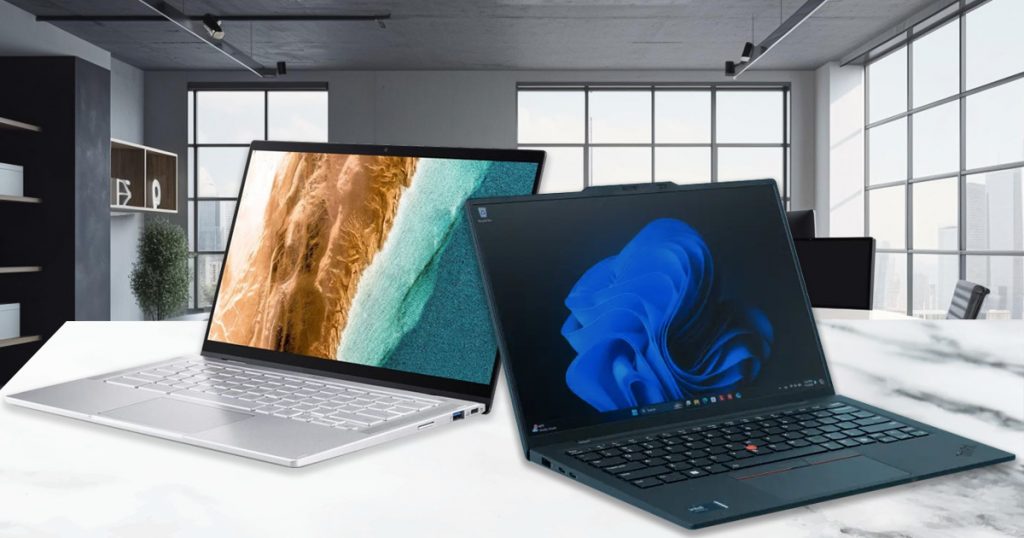A laptop is more than just a tool for professionals. It’s the hub for meetings, emails, spreadsheets, and everything in between. Choosing the best laptop for work can feel overwhelming, especially with so many options on the market. If you’re wondering what specs to look for in a laptop or which features matter most for business use, you’re in the right place.
1. Pick the Right Operating System for Your Workflow
Windows, macOS, and ChromeOS each offer a different user experience. Windows works well with many software tools, especially in corporate environments. macOS is popular with creatives and users of the Apple ecosystem. Chromebooks run on ChromeOS, which works best for browser-based tasks and cloud storage. Choose the one that matches your daily needs and comfort level.
2. Choose a Processor That Matches Your Workload
The processor, or CPU, impacts how fast your laptop performs. For basic office work, an Intel Core i5 or AMD Ryzen 5 offers a great balance. If your work involves heavier tasks like video editing or data analysis, go with an Intel Core i7 or higher. These options deliver faster speeds and better multitasking. For long-term value, avoid lower-end processors like Intel Pentium or Celeron, especially if you plan to use your laptop for several years.
3. Don’t Settle for Less Than 16GB RAM
When checking laptop specs for office work, pay close attention to memory. RAM helps your laptop handle multiple apps at once. For business tasks like video calls, presentations, and browser tabs, 16GB is the sweet spot. Some laptops come with 8GB, but you’ll likely notice slowdowns if you multitask often. If you work with large files or use professional software, 32GB or higher may be worth the upgrade.
4. Go for an SSD to Boost Speed and Efficiency
Storage matters more than just saving files. A solid-state drive (SSD) makes your laptop faster when opening files or starting up. Choose at least 256GB SSD for regular business use. If you work with media files, large datasets, or install multiple apps, aim for 512GB or 1TB. SSDs are quieter and more reliable than traditional hard drives, too.
5. Pick the Right Screen Size and Display Type
Your laptop’s screen can affect your productivity and comfort. A 14 to 15-inch screen hits the right balance between portability and viewing space. If you’re always on the go, a 13-inch model might be easier to carry. Look for a full HD resolution (1920×1080) for sharp visuals. Matte displays reduce glare, while touchscreen options offer more flexibility for creative or design work.
6. Make Sure the Battery Life Lasts Your Workday
Battery life can make or break your workflow, especially if you attend meetings or travel often. A good business laptop should last at least 8 to 10 hours on a full charge. High-performance laptops may have shorter battery life, so check if fast charging is supported. Avoid relying only on manufacturer claims. User reviews often give better insight into real battery performance.
7. Choose a Keyboard and Trackpad That Feel Right
Don’t overlook comfort when picking the best laptop for work. You’ll spend hours typing emails and reports, so a responsive keyboard is key. Look for keys with enough travel and spacing. The trackpad should be smooth and accurate, with multi-touch gestures. Backlit keyboards help in low-light settings, especially during travel or late-night tasks.
8. Check Ports and Connectivity Options
Having the right ports saves you from carrying extra dongles. Most laptops should offer USB-A, USB-C, and HDMI or display output. If you work with SD cards or external monitors, confirm these ports are included. Also, check if Wi-Fi 6 and Bluetooth 5.0 are supported. These ensure faster connections and better compatibility with accessories.
9. Don’t Ignore Build Quality and Durability
A business laptop should handle daily wear and tear. Choose a device made from aluminum or magnesium alloy instead of plastic. These materials offer better strength without adding much weight. Some models are even tested against military-grade standards for shock, vibration, and temperature. Spill-resistant keyboards and reinforced hinges are also helpful if you’re rough on gear.
10. Match the Laptop to Your Specific Use Case
The best business laptop depends on your profession. If you’re a writer or admin worker, something lightweight with solid battery life will do. Designers or engineers may need higher graphics performance and larger displays. If you travel frequently, look for a thin and light model with a strong battery. Knowing how you’ll use the laptop helps narrow the list and avoid paying for features you won’t use.
Choosing Well Today Saves You Time Tomorrow
Buying a laptop is an investment in your work performance. Instead of picking the flashiest model, focus on what helps you get things done. A laptop that matches your workflow can boost output, reduce stress, and last longer, making it the best laptop for work in the long run.

